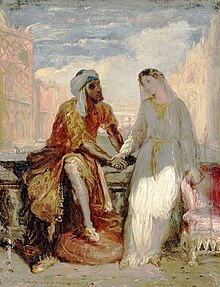Dearest reader,
I am in love with the idea of true romance. When I think of romance in literature I am transported to late 16th-century Venice amid the Ottoman and Venetian War. Othello follows a black military commander who falls in love with Desdemona, the daughter of a Venetian senator. The pair overcomes the social barriers around interracial relationships, but their story ultimately ends in tragedy. Iago, Othello’s attendant, manipulates the general into believing his wife is having an affair. Although he sincerely loves Desdemona, Othello tragically kills her out of jealousy. After learning of her innocence, Othello is unable to grapple with his grief and commits suicide to atone for his crimes.
I don’t think the tragedy of this story tears apart ideas of love; it only amplifies them. There is a quote in Nicholas Sparks’s Nights in Rodanthe that says, “The greater the love, the greater the tragedy when it’s over.” The end of Desdemona and Othello’s story has a greater emotional impact because the audience sees that they truly love each other. Their relationship doesn’t seem manufactured, like many modern love novels. Their love is believable because it is organic; Desdemona falls in love with Othello after listening to his stories about his adventures. They commit to each other despite the contention surrounding their elopement. The audience is convinced of their love because they are willing to go against contemporary social conventions to be with each other.
Their tragic ending does not necessarily “destroy the idea of love.” Othello was revolutionary for its time because it explored a genuine relationship that challenges the disapproval of love between race and class. It sets the stage for common humanity by reflecting the racial tension of the time without forcing Othello into a caricature and has a unique ability to resonate with the audience by depicting how fleeting love can be.
There is something poetic about the portrayal of love that persists in a society that invalidates interracial love, so much so that Othello is accused of using witchcraft to make Desdemona fall in love with him. There is also something poetic in a love story that ends in tragedy. I am not against happy endings; there are times when a fairytale ending is exactly what we need to escape our cruel reality. However, there is a reason why we still read Shakespeare. A representation of love that is so realistic and raw makes Othello’s themes are so timeless.
Sometimes, love is tragic. Older forms of literature demonstrate this beautifully. Modern love novels are so concerned with providing their audience with the picture of the perfect “boyfriend” that they lose their authenticity. I was never interested in the “troubled bad boy meets the innocent smart girl” or “golden-retriever boy meets black-cat girl” tropes. I first noticed the resurgence in popularity of these tropes towards the end of quarantine, which marks the increased traction of “BookTok,” This subculture of TikTok has arguably transformed the world of literature by placing a new emphasis on tropes and sexual themes in literature. Modern love novels are so hypersexualized that they lose sight of the multifaceted experience of being in a relationship (which sometimes ends in tragedy). Post-quarantine, authors seem more concerned with creating surface-level characters that fit into a trope rather than crafting a storyline that portrays a more natural character development. I think of books published soon after 2020 like IceBreaker, Twisted Love, Dating Dr. Dil, and It Happened One Summer that gained popularity on BookTok for fulfilling various tropes and having an abundance of “spicy scenes.”
I don’t think sex should be a taboo subject; it is a part of life that has always been present in literature. However, the obsession with “spicy” scenes in books has placed a huge strain on the quality of modern literature. There is more to love than lust. In Chapter 9 of Hannah Grace’s Icebreaker, Nate finds Anastasia’s G-spot “in 2.5 seconds.” In Chapter 9 of E.M Forster’s Maurice, Maurice is confronted with an unconventional identity as a gay man when Clive whispers “I love you” for the first time. Modern novels fail to engage with the revolutionary themes that make classics so compelling. It’s almost as if they are manufactured to check a series of boxes: typical trope dynamic, spicy scenes, bright colorful covers with faceless illustrations of people, and more spicy scenes.
The development of how relationships have been portrayed in literature since the 19th century is fascinating. Love is a special feeling because it transcends time. People loved each other during the 18th century, and they still love each other in the 21st century and will continue to love until the end of human civilization. The problem with the modern love novel is that the idea of romance in media has been ruined by capitalistic motivations to sell a specific fantasy to a tailored audience. Life no longer imitates art far more than art imitates life in this respect.
I think everyone should be able to read the books they like without judgment; if you enjoy YA romance novels, indulge to your heart’s content. As a hopeless romantic, I can’t help but miss some of the romantic elements present in classic literature.
With Love,
M.T

Leave a Reply